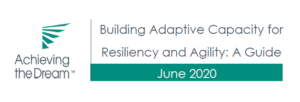As we move into a “new normal” where digital and virtual models are playing a larger role in the delivery of instruction and student supports, it’s increasingly important for us to deliver holistic, resilient, equitable, and student-centric systems. This requires transitioning to an adaptive culture that focuses on long-term sustainability through the generation of alternate paths, ideas, modes of operating, and behavioral norms.
Colleges are asking questions such as “How robust and equitable are our programs and supports? Can they adapt to ongoing change, uncertainty and volatility?” ATD recognized many years ago that answers to questions like these are fundamental to improving student outcomes and reducing equity gaps at scale and for the long-term.
ATD also recognized that outcomes improvement cannot be realized or sustained without changing institutional culture. As a result, ATD created the Institutional Capacity Framework based on over ten years of field experience. This experience reinforced the importance of student-centered institutional transformation that improves student success outcomes with equitable results. The Institutional Capacity Framework identifies seven fundamental capacities that are required for sustainable cultural change.
